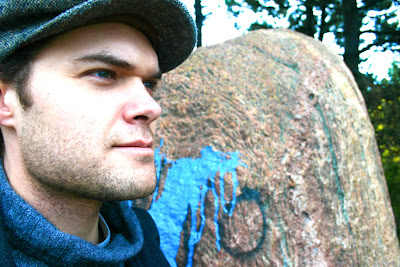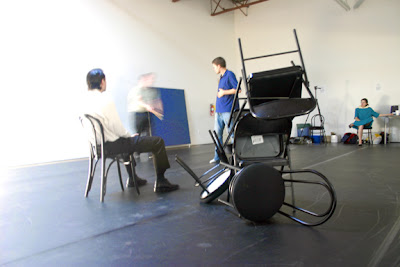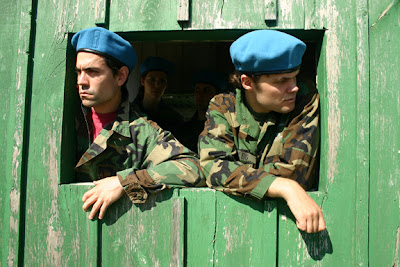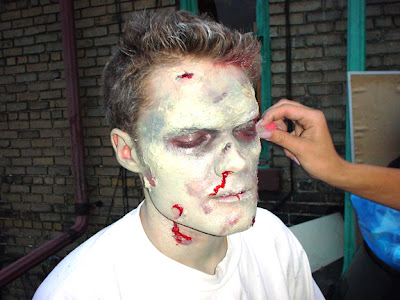 1) What the fuck is going on?
1) What the fuck is going on?
Day Camps and Drunks in Moss Park, sunburns, futile attempts at avoiding temptation, sweat, potato chips, theories of vast conspiracies, too much coffee.
2) Why are you adapting Albert Camus’ classic existential novel, The Stranger, for the stage?
Mostly, because I feel it offers a rich springboard for an ensemble to create a new piece of theatre that is very personal and allows them to experiment and work in unconventional ways. It is a novel that examines some of the most important questions pertaining to our existence and our experience of the world, and for this reason it seems perfect to me for the stage.
Its main character has a wonderful naivety or lack of understanding towards human ritual and convention, so this challenges us dramatically to also look with fresh eyes at the mundane details of everyday life. I also love having a main character who doesn’t speak very much, and the physical demands that places on the ensemble to create his inner life for the audience. Beyond that, it’s just a damn good story!
3) As a director, how have you approached structuring the workshop process for this project?
Coming into our first workshop I had the actors prepare a short silent scene, based on a simple thematic idea from the novel. I asked the actors to draw from personal experience to create this scene. On the first day they performed their scenes solo and then we gradually improvised to bring these solo pieces together. Without specifically letting the cat out of the bag, I gradually moved the actors towards a scene I had in mind from the novel by having them make small adjustments to their pieces.
I also put a heavy emphasis on creating a strong ensemble. We probably spent a disproportionate amount of time just working exercises geared to this end. I think actors are often impatient with this work, but for this piece in particular I think it is essential. I also try to keep this work as fun as possible.
4) How might the novel’s existential themes show themselves in the final work?
Camus always felt uncomfortable being labeled an existentialist. I feel like it’s a term thrown around a lot, but nobody really knows what it means. I’m not sure I do. On close reading The Stranger has conflicting messages that don’t strictly adhere to any so-called existential dogma. That said, one of my main questions in approaching this work is what it could mean to live a more authentic life, or to experience life with less pre-constructed meaning. I am trying to approach this idea through basic human interactions, rather than as intellectual ideas in textual form. I think this is one of the things plays can do very well.
5) Do you have any unifying theories that inform your approach to directing theatre?
Always go into rehearsal with lots of ideas and be prepared to throw them all in the trash within five minutes. Try not to work too directly towards the outcome that you desire, in fact don’t be afraid to work far off in a different direction, before slowly making your way back towards your original idea. Always be highly suspicious of something that comes very quickly and easily in rehearsal. If it seems too good to be true, it probably is.
6) How has your interest in American politics influenced your ideas about theatre?
American politics have all the great elements of drama – farce, tragedy, absurdity, heroes, villains, clowns – the stakes are always high and although much focus has been put on the circus-like atmosphere of modern American politics, we all want to know what the next Act will bring. The Bush administration has felt like the usurping power in one of Shakespeare’s histories. With Donald “Rummy” Rumsfeld emerging as chief rhetorician, uttering such poetic lines as, “The absence of evidence, is not evidence of absence,” when no WMDs were found in Iraq. That’s a beautiful line!
I guess what I’m saying is that my passion for American politics deepens my understanding of theatre, and vice-versa.
7) Do you think conservative, right-wing politics are somehow fundamentally at odds with the arts community?
No. I have supported the NDP for years and I guess you might say my politics are left-wing. But I find this dichotomy between left and right antiquated and not particularly useful. What is right? What is left? Any model I can think of is outdated. While it might feel good for artists to believe that there is a whole group of politically like-minded people out there who are “fundamentally at odds” with them, I think it is, unfortunately, just a fantasy.
8) Do you have a working definition of what it means to be an artist?
Anyone who practices or performs one of the creative arts. It’s from the dictionary, but I think it works.
9) What theatre-related topic is most likely to send you into a heated debate?
Certain actors and directors have a sort of dogmatic attachment to “actions”, “intentions”, and all the jargon trumpeted by David Mamet and other disciples of Practical Aesthetics. While these are useful techniques for helping actors break down conventional scripts, they can be very limiting, particularly when they are confused with creative process. We need to take the good from these techniques without letting them limit our imaginations as to what a play or theatre should be.
 10) What are you optimistic about?
10) What are you optimistic about?
Theatre, love, truth, justice, and Al Gore.



“American politics have all the great elements of drama – farce, tragedy, absurdity, heroes, villains, clowns – the stakes are always high and although much focus has been put on the circus-like atmosphere of modern American politics, we all want to know what the next Act will bring.”
I love it!
i have this awesome idea for a marat/sade set in guantanamo bay. anyone got $100,000 to see if I’m right?
btw. simon, nice interview. Anyone using PA properly shouldn’t be bringing it into the rehearsal room though. The whole point of the system is that it’s all work you do BEFORE you get there.